6-27-10
Anton Chekhov’s The Duel: Dover Kosashvili Fuels a Classic
By Diane Sippl
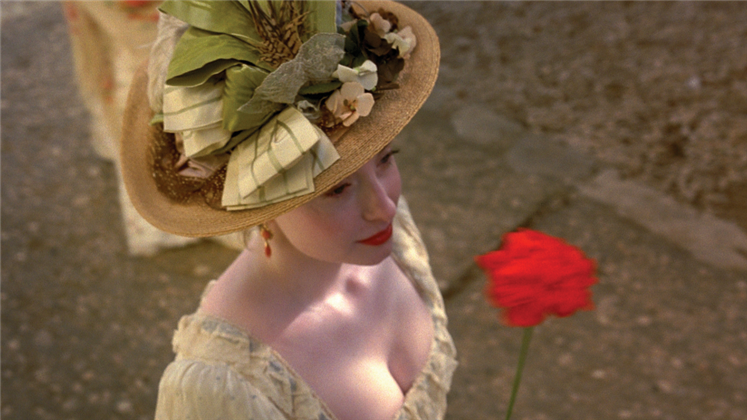
Fiona Scott as Nadya
I. What an enthralling experience it is to watch The Duel — not so much the duel itself (which in theory could give one the queasy-guilty-perverse sensation of attending a lynching or a day at the guillo-tine) — but the sparring as it plays itself out in so many words, settings, ideas. Dueling per se was, after all, long out of date by Chekhov’s time, so in his novella, as exquisitely adapted for the screen by director Dover Kosashvili from a script by Mary Bing, the whole situation arises quite offhandedly, by mistake, even, amidst misguided accusations, true confessions, and terrific candor in the expression of social thought and personal bile alike.
In “The Duel,” Chekhov takes us to a sleepy resort in the Caucasus on the southeastern coast of the Black Sea, where the towering mountains and the torrid days and nights of mid-summer weigh upon two visitors with unexpected angst. Pushkin, of course, found the wild Caucasus at once dangerously alluring and naturally therapeutic; legendary for his own personal dare-devil duels — fighting in snowy blizzards and often egging-on his opponents for second rounds — he finally died in one. If Shakespeare inspired Pushkin with Romeo’s face-off with Mercutio, then Lermontov and Turgenev were among the Russian bard’s successors with this curious stroke of chivalry, at least in their books, and with a nod to them all, Chekhov picked up their trail with utmost irony.
In the climactic event of the film, Laevsky, sweating and sobbing, with convulsive stomach, protruding head, bulging eyes, offers his apology if that would do. After all, they can’t really be ready to kill each other, his second man argues. They should shake hands and go on about their day.
But Von Koren the Social Darwinist is out to get Laevsky the Superfluous Man. “It’s not enough to say a duel’s an outworn formality; go home magnanimously and drink. A duel’s a duel — I want to fight! I want to fight!” His voice echoes in the cave by the waterfall, he snarls his mouth into a grimace, and he aims his shaking gun.
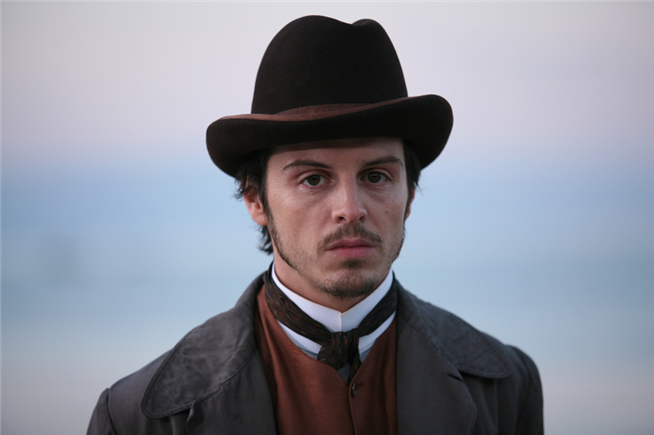
Andrew Scott as Laevsky
II. In fact, just days earlier, everyone rode off to a picnic together at this very location, one of those majestic sites where two rivers meet at the edge of a mountain meadow. “But just look at this panorama!” sighs Samoilenko, an elderly, kind-hearted nobleman who would give his right arm for some peaceful co-existence among his friends.
“I don’t see anything good in it,” replies Ivan Andreich Laevsky. “To constantly go into raptures over nature is to show the paucity of your imagination. All these brooks and cliffs are nothing but trash compared to what my imagination can give me.” These are the words of Chekhov, in a tongue-in-cheek defense of the writer that also betrays his infatuation with the region. Moments later, the same miscreant Laevsky flips his stance, not knowing how to be, other than to be contrary.
“Ivan Andreich, describe this view!” begs the local socialite Marya Konstantinovna, with tears of joy, in the film’s dialogue. And his retort, paradoxically more cinema-bound:
“What for? The impression is better than any description. When writers babble about this wealth of colors and sounds that we all receive from nature by way of impressions, they make it ugly and unrecognizable.”
And now Von Koren the zoologist jabs at Laevsky the literary savant, “What of Romeo and Juliet? Pushkin’s night in the Ukraine?” and we find ourselves caught up in a century-old challenge: the art of bringing literature to the screen. How to sustain the imagination of the page with the sensations of the screen? How to show the exhilaration of words in images?
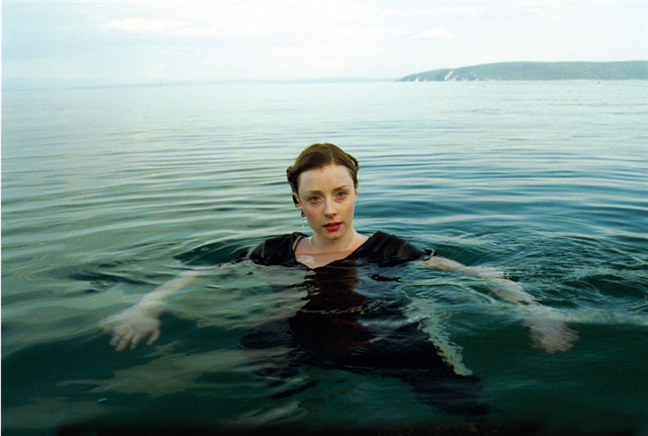
Fiona Glascott a Nadya
III. In 1888 Chekhov had entered the ranks of “serious” literature with his first novella, “The Steppe,” winning the Pushkin Prize and, by the age of twenty-eight, becoming one of the most famous Russian writers. In large part, his innovation was that of being the most cinematic writer of his day: he wrote largely in streams of images — vivid, prescient, open, and real but also contradictory, mysterious, and fleeting. The cinema, which was soon to rise to his gifts, had only to “catch” that reality in all its wonder.
That same year, the restless
Chekhov, tired of the literati of St. Petersburg,
took a trip to the Crimea to stay with his new-found editor, Alexei Suvorin,
and decided to take a steamship with Suvorin’s son, just older than he was,
down the coast of the Black Sea to Sukhumi
in Abkhazia. They stayed in a monastery
where Chekhov befriended a local bishop.
When he continued on to Batumi
and inland on the
In the summer of 1891, Chekhov met a zoologist who struck up nightly debates with him over evolution and degeneration of the species. That July Chekhov also appealed to his sister’s friend, Lika Mizinova, with whom he had begun to grow very close, to come and stay with him at his family’s dacha. His letters to lure her there were nothing short of charming, but enamored as he was of her, she seemed to prefer to arouse his jealousy with one of his oldest and closest friends, the artist Isaak Levitan. Meanwhile Lidia Avilova had befriended him two years earlier and later claimed to have had a love affair with him. In any event, just as he was to begin writing “The Duel,” he ended a letter to his friend, Suvorin, in May, 1891 by reassuring him, “I have no intention of getting married. My desire now is to become a bald little old man and sit behind a big desk in a nice study.”
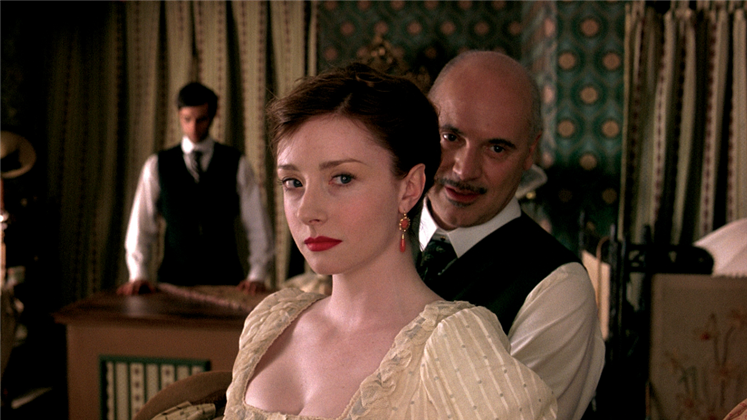
Fiona Scott as Nadya and Graham Turne as Atchmianov, Senior
My very dear Alexey Nikolayevich, can you
imagine, I am neither abroad nor in the Caucasus, but have already been holed
up for two weeks on my own in a one-and-a-half-rouble room in that city of
Tatars and hairdressers, Yalta. I was
supposed to be going abroad, but fetched up unexpectedly in Odessa and stayed
there for ten days; having eaten up half my fortune on ice cream (it was very
hot), I traveled on to Yalta. There was
no point in coming here, and there is no point in staying here either. I swim in the mornings and expire from the
heat in the afternoons. In the evenings
I drink wine and at night I sleep. The
sea is magnificent, the vegetation unimpressive. Every day I make up my mind to leave, but
somehow I keep not doing so. But I need
to leave. My conscience is prickling me
horribly. It’s shameful to be living so
sybaritically when things are awry at home.
When I left the atmosphere was depressed and fearful… Despite the heat
and the temptations that abound in
— Anton Chekhov to Alexey Plecheyev, 3 August, 1889,
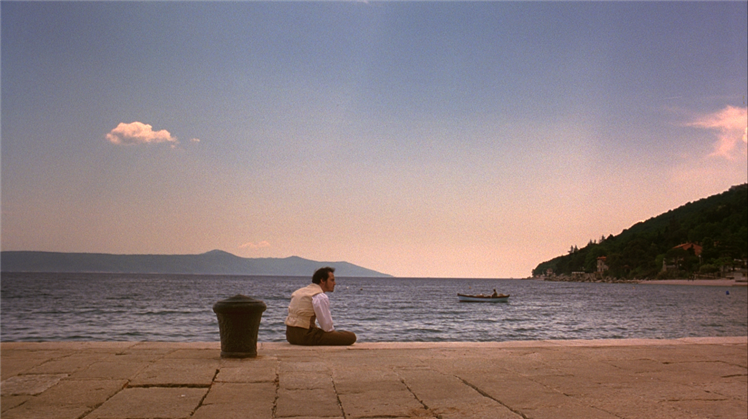
Andrew Scott as Laevsky
IV. At the picnic, the first event shared by the entire ensemble of The Duel’s characters, on the footbridge over a river that has carved a rocky overhang and cave, Laevsky and his companion, Nadezhda, look out at the rushing waterfall. He has something terribly important to tell her. It should change their lives utterly under normal circumstances, and save them from a rather “indelicate” situation. Nadezhda’s husband has just died, and while neither of these runaways would grieve over his loss since he is the one they fled, they could marry now all too conveniently. Laevsky withholds from Nadezhda the letter bearing the news, but that night when he lets it out, the real indelicacy transpires: neither eloper now cares for the other, and worse, neither can quite say it.
Laevsky, bored with his lot in the Caucasus, has been doing his best to abandon Nadezhda since the story opened, and Nadezhda has been holding private “interviews” with admirers to feed her vanity, keep herself in fine costume, and distract her from her disappointment there. Worse, Laevsky knows of her trysts, having long before detected duplicity in her every move and even an affected posturing while alone with him. His eyes see a coquettish pretense in her manner, to the extent that she seems to be feigning intelligence and social virtue to win people over to her. Granted, she knows this, and feels guilty about it herself. But look at Laevsky: he is hardly a man of integrity, and he, too, is shaken by his own lies and worse, his self-deceit, of which he is also painfully aware.
If this is getting too complicated, it is Chekhov — layers of lies infested with more lies, especially to oneself, and especially with that sinking feeling of knowing one’s own delusions. It is also us. The duel, one enormous faux pas that comes to pass for “normal” people, comes from the failures in everyday life.
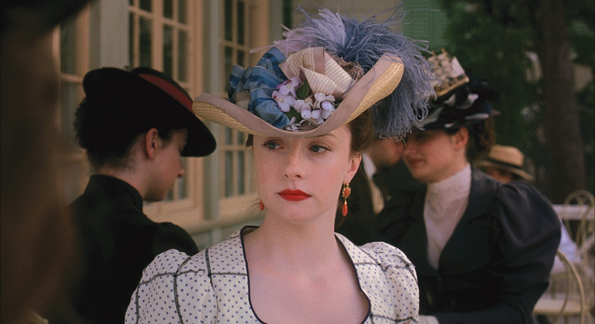
Fiona Glascott a Nadya
V. Likewise, not only does this awkward impasse for Laevsky and Nadezhda complicate their plans — though they can hardly have any, given the lives they lead — but there are all too many eyes and ears in this slow seaside town of promenades, massages, and teas in the pavilion, of summer idlers, underem-ployed officers, retired nobles, clergy, and lay-abouts. The police captain has little better to do than to press Nadezhda to let their one-time fling blossom again, nor does the milliner mind propositioning her to “settle” her overdrawn account in a Mme. Bovary-like fashion. “Isn’t it the male peacock who gives us his feathers?” she flirted with the milliner, who then crowned her with the “enchanting” concoction of flowers, feathers, and frills with a tell-tale smile.
Then there is Marya Konstantinovna, who feels it her duty to instruct Nadezhda on wifely virtues: splashing cold water on her face each morning to freshen up for her husband, while tying his cravat for him. “That’s nonsense,” retorts Nadezhda. And why should she marry, anyway? It would just be more of the same she has now. “Settle down? How do you mean? I have not lived yet, and you tell me to settle down… If only I were happy. I’m so unhappy… I will go away, to Moscow…”
Both Nadezhda and Laevsky are stricken with physical setbacks, she with some kind of on-going fever or feminine ailment, and he with what the scientist Von Koren notes has indeed been known as a “female disorder: hysteria. To see Laevsky work his way into a bonafide “fit” at a name day party where all the town is present is to marvel both Chekhov’s writing at that moment in his life (his transition from short stories to his first successes with the theatre, especially his broad farce “The Bear”) and the riotous finesse with which Dover Kosashvili directs his film. Lead actor Andrew Scott is Laevsky incarnate, and with thespian virtuosity aided by Chekhov’s own virtual stage directions in writing Laevsky’s role, we see the tormented ne’er-do-well quiver with wanton moves at the card table until he finds himself “yelping like a lapdog” and has to be carried off by sympathetic comrades from a scene that will be impossible to forget (especially for the audience).
What’s more, the next day, humiliated and desperate to leave the town, Laevsky is even more beside himself as he arrives at Samoilenko’s to beg once again for the funds to do so:
Whose business is it what I do and how I live? Yes, I want to go away. I’m in debt, yes. I drink. I’m living with another man’s wife. I’m hysterical. I’m ordinary. I’m not so profound as some people. But whose business is that? Respect other people’s individuality! This continual gossip about other people’s private affairs, this sighing and groaning and everlasting prying, this eavesdropping, this friendly sympathy — damn it all — I want nothing! I’m not a schoolboy. I’m not insane! And I beg you to stop looking after me. I beg you volunteer detectives to give up your spying. Enough. Enough!
— Mary Bing’s screenplay for The Duel
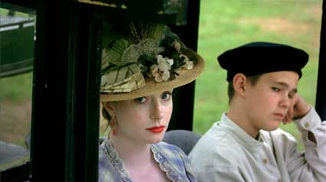
Fiona Glascott as Nadya
This time what Laevsky disliked most of all in Nadezhda Fyodorovna was her white, open neck and the little curls of hair on her nape, and he remembered that Anna Karenina, when she stopped loving her husband, disliked his ears first of all, and he thought: ‘How right that is! How right!’ …Sluggish, vicious thoughts, all about the same thing, dragged through his brain like a long wagon train on a rainy, autumnal day, and he lapsed into a drowsy, oppressed state.
— Anton Chekhov, “The Duel”
She reasoned joyfully that there was nothing
terrible in her infidelity; her soul took no part in it; she continues to love
Laevsky, and that is obvious from the fact that she is jealous of him, pities
him, and misses him when he’s not at home.
Kirilin turned out to be so-so, a bit crude, though handsome; she’s
broken everything off with him and there won’t be anything more. What there was is past, and it’s nobody’s
business, and if Laevsky finds out, he won’t believe it.
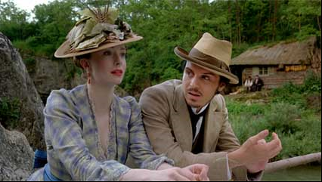
Fiona Glascott as Nadya and Andrew Scott as Laevsky
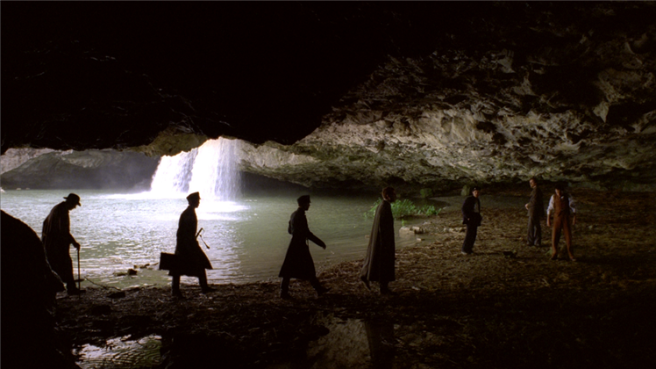
Beneath the picnic grounds, the site of the duel
VI. Just as Chekhov’s writing is filled with dualisms — the North with its “pines, mushrooms, people, and ideas” and the South with its “stifling heat, poisonous spiders, and utter lack of society”; the senses, exotica, even erotica as opposed to the mind, ideas, culture, work; real, tangible, generous compassion versus the ideals and philosophies of Laevsky and Van Koren alike — Dover Kosashvili enriches his visual tableaux with a deliciously playful motif of doubles — an organ grinder and his alter-ego monkey who amuse at the name day feast; twin soldiers in gleaming white uniforms and gold epaulets who beam their smiles at Laevsky on the verge of a breakdown; Nadezhda, the real lady with the hat, facing the one in the milliner’s mirror, which has unfortunately (for her) become a two-shot; the Fragonard-style painting on her wall at home where there are two on the swing, the Laevsky-like man beside her gazing at her pleasure while her own red slipper is already tossed off onto the floor; the actual Laevsky falling into a fit and the caricature of him that Von Koren is sketching beside him.
The film opens ingeniously with a “savage” drunken brawl that rambunctiously pre-figures the real duel to come: at night on the long porch, one crony tosses fruits at Laevsky, who is armed with a butcher knife in each hand and succeeds in catching first an apple and then a pear on the tip of each knife, holding them up to a chorus of “hoo-rahs!” Soon thereafter out by the sea for tea, a lady seated behind Nadezhda provides visual mockery of Nadezhda’s outlandish hat by going one further: hers has a sailing ship upon it, sculpted of pin-striped grosgrain ribbon. And as Laevsky recovers in his own sickbed (recalling Nadezhda’s), she twirls a model of a lighthouse in her hands beside him, recalling the beached, turned-over skiff we saw as he went to seek solace on the embankment.
Nadezhda herself is two women, the one in flame-red lips to match the bright coral drop earrings that show off her gleaming blue eyes and porcelain skin, and the more naïve-looking one without make-up who looks ten years younger, a more interesting countenance because without her theatricality, she is inscrutable.
And yet somehow truth emerges as the presiding theme by the end of The Duel: for all of Laevsky’s and Nadezhda’s private intrigues and dreams, secret thoughts and self-images, the ambiguity that surrounds their discreet pursuits shifts like clouds leaving occasional sunspots on the waves. Von Koren’s study of the embryology of the medusa, Laevsky’s quest for a serious life of committed work, and Nadezhda’s yearning for a hillside vineyard with grapes to harvest might all be possible. That possibility of truth sits on the horizon.
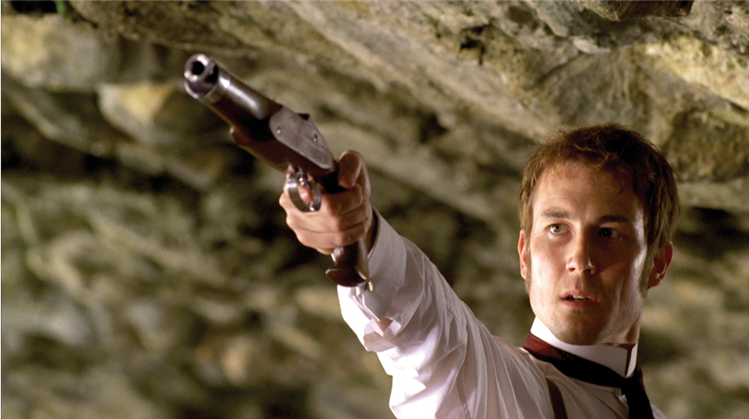
Tobias Menzies as Von Koren
VII. The sumptuous russets and teals of Ivo Hušnjak’s production design and Sergio Ballo’s costumes along with the antique ochres and French pinks of Nadezhda’s boudoir make for a rich and varied palette fitting to both the era of beveled-tile stoves and low-arched kitchen ceilings and their seaside setting with its lush hills and its waters engulfed by cliffs and caves.
Angelo Milli’s score is simple, ominous, never intrusive and always bearing the alternating rhythms and counter-rhythms that are Chekhov’s view of life, one as innocently trivial as the squeals of excitement in a racing carriage and at the same time, as wide and ponderous as the sky.
Mary Bing’s script never shies away from the beautifully intricate, tormented views the characters hold of each other, anchored in and yet free of the intellectual debates of the times. Kate Williams’ editing does with Chekhov’s story what Tolstoy fantasized doing when he heard of the first experiments with the Kinetoscope; Williams’ cross-cutting in early scenes of The Duel to introduce the characters brings an economy to the film that the Russians would soon master for the screen.
Paul Sarossy’s photography endows the film with the keen sense of atmosphere inherent in Chekhov’s literature, Sarossy's camera distance acknowledging the awe Chekhov had of nature in all its mystery and its quiet reserve of profundity. This camera position also respects the observational tone and the airs of the characters, bringing them to life without ever being showier than they are themselves. After all, this is an actors’ film, and Andrew Scott owns it with his ever-expressive face but also his entire body, playing the role of Ivan Andreich Laevsky down to his toes.
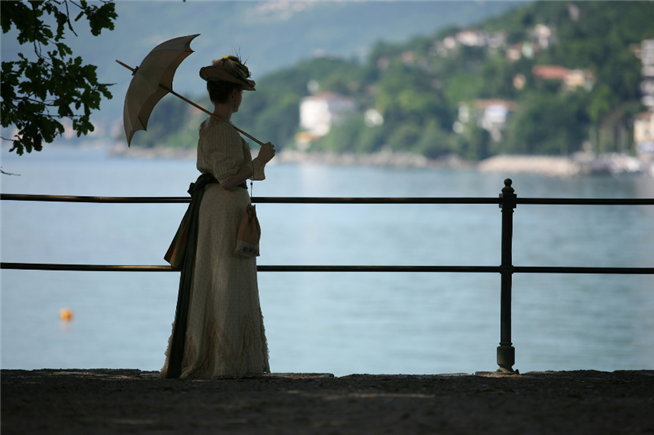
Fiona Glascott as Nadya
Anton Chekhov’s The Duel
Director: Dover Kosashvili; Producers: Donald Rosenfeld, Mary Bing; Screenplay: Mary Bing based on the novella “The Duel” by Anton Chekhov; Cinematographer: Paul Sarossy, C.S.C., B.S.C.; Editor: Kate Williams; Production Designer: Ivo Hušnjak; Costume Designer: Sergio Ballo; Composer: Angelo Milli.
Cast: Andrew Scott, Tobias Menzies, Fiona Glascott, Niall Buggy, Michelle Fairley, Jeremy Swift, Nicholas Rowe, Debbie Chazen, Rik Makarem, Simon Trinder, Graham Turner, Alister Cameron, Mislav Čavajda, Nina Serdarevič, Juraj Krševan Dovranič, Sreten Mokrovič, Tvrtko Jurič, Goran Vrbanič, Mladen Vulič.
Color, 35mm, 95 minutes. In English.